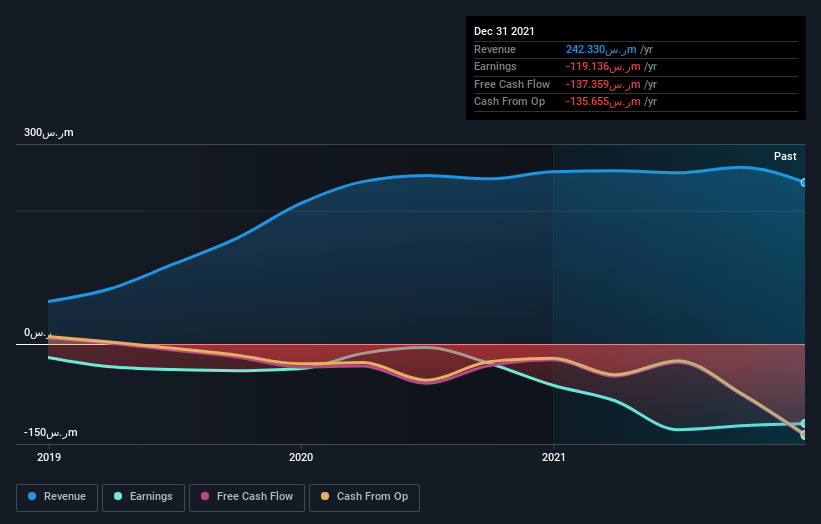- Saudi Arabia
- /
- Insurance
- /
- SASE:8310
The one-year earnings decline has likely contributed toAmana Cooperative Insurance's (TADAWUL:8310) shareholders losses of 62% over that period

Investing in stocks comes with the risk that the share price will fall. Unfortunately, shareholders of Amana Cooperative Insurance Company (TADAWUL:8310) have suffered share price declines over the last year. In that relatively short period, the share price has plunged 62%. At least the damage isn't so bad if you look at the last three years, since the stock is down 6.0% in that time. Shareholders have had an even rougher run lately, with the share price down 25% in the last 90 days. This could be related to the recent financial results - you can catch up on the most recent data by reading our company report.
If the past week is anything to go by, investor sentiment for Amana Cooperative Insurance isn't positive, so let's see if there's a mismatch between fundamentals and the share price.
See our latest analysis for Amana Cooperative Insurance
Because Amana Cooperative Insurance made a loss in the last twelve months, we think the market is probably more focussed on revenue and revenue growth, at least for now. Generally speaking, companies without profits are expected to grow revenue every year, and at a good clip. That's because fast revenue growth can be easily extrapolated to forecast profits, often of considerable size.
In just one year Amana Cooperative Insurance saw its revenue fall by 6.2%. That's not what investors generally want to see. In the absence of profits, it's not unreasonable that the share price fell 62%. Fingers crossed this is the low ebb for the stock. We don't generally like to own companies with falling revenues and no profits, so we're pretty cautious of this one, at the moment.
You can see below how earnings and revenue have changed over time (discover the exact values by clicking on the image).

Take a more thorough look at Amana Cooperative Insurance's financial health with this free report on its balance sheet.
A Different Perspective
While the broader market gained around 27% in the last year, Amana Cooperative Insurance shareholders lost 62%. Even the share prices of good stocks drop sometimes, but we want to see improvements in the fundamental metrics of a business, before getting too interested. Unfortunately, last year's performance may indicate unresolved challenges, given that it was worse than the annualised loss of 0.8% over the last half decade. Generally speaking long term share price weakness can be a bad sign, though contrarian investors might want to research the stock in hope of a turnaround. While it is well worth considering the different impacts that market conditions can have on the share price, there are other factors that are even more important. Consider for instance, the ever-present spectre of investment risk. We've identified 4 warning signs with Amana Cooperative Insurance (at least 2 which shouldn't be ignored) , and understanding them should be part of your investment process.
Of course, you might find a fantastic investment by looking elsewhere. So take a peek at this free list of companies we expect will grow earnings.
Please note, the market returns quoted in this article reflect the market weighted average returns of stocks that currently trade on SA exchanges.
New: Manage All Your Stock Portfolios in One Place
We've created the ultimate portfolio companion for stock investors, and it's free.
• Connect an unlimited number of Portfolios and see your total in one currency
• Be alerted to new Warning Signs or Risks via email or mobile
• Track the Fair Value of your stocks
Have feedback on this article? Concerned about the content? Get in touch with us directly. Alternatively, email editorial-team (at) simplywallst.com.
This article by Simply Wall St is general in nature. We provide commentary based on historical data and analyst forecasts only using an unbiased methodology and our articles are not intended to be financial advice. It does not constitute a recommendation to buy or sell any stock, and does not take account of your objectives, or your financial situation. We aim to bring you long-term focused analysis driven by fundamental data. Note that our analysis may not factor in the latest price-sensitive company announcements or qualitative material. Simply Wall St has no position in any stocks mentioned.
About SASE:8310
Amana Cooperative Insurance
Provides various insurance products and services in the Kingdom of Saudi Arabia.
Flawless balance sheet with questionable track record.
Similar Companies
Market Insights
Community Narratives



